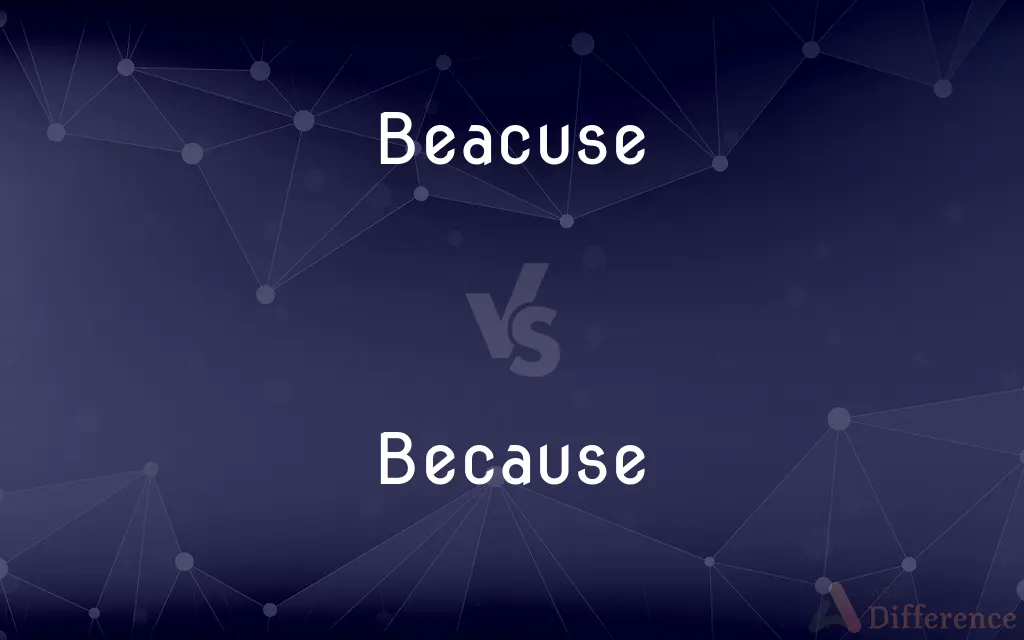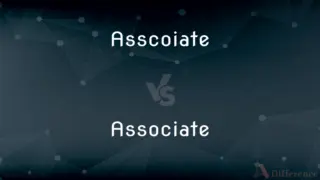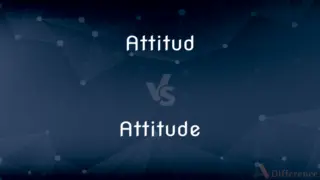Beacuse vs. Because — Which is Correct Spelling?
Edited by Tayyaba Rehman — By Fiza Rafique — Updated on April 1, 2024
Beacuse is an incorrect spelling of Because. "Because" is a conjunction used to introduce a reason or explanation.

Table of Contents
Which is correct: Beacuse or Because
How to spell Because?

Beacuse
Incorrect Spelling

Because
Correct Spelling
ADVERTISEMENT
Key Differences
Link "because" to “cause” which is embedded in it, and just add “be” at the start.
“Big Elephants Can Always Understand Small Elephants” – each initial letter helps remember the spelling of "because."
Pronounce it as "be-kuz" to remember the order of letters.
Think of a rhyming word like "fleece" to recall the "eca" order in "because."
Integrate "because" into your daily vocabulary to make the correct spelling a habit.
ADVERTISEMENT
How Do You Spell Because Correctly?
Incorrect: I didn't go to the party beacuse I was sick.
Correct: I didn't go to the party because I was sick.
Incorrect: He didn't answer the phone beacuse he was already asleep.
Correct: He didn't answer the phone because he was already asleep.
Incorrect: We can't go outside beacuse it's raining.
Correct: We can't go outside because it's raining.
Incorrect: The event was cancelled beacuse of the storm.
Correct: The event was cancelled because of the storm.
Incorrect: She was late beacuse her car broke down.
Correct: She was late because her car broke down.
Because Definitions
Because introduces a reason.
She cried because she was happy.
Because links cause and effect.
He ran because he was scared.
Because often initiates explanation.
The event was canceled because of the rain.
Because connects action and motive.
She reads because she loves stories.
Because can imply a condition.
He'll succeed because he works hard.
For the reason that; since.
(archaic) For the reason that.
On account of, for sake of.
My life is ruined because of you!
(by ellipsis) Used alone to refuse to provide a full answer a question begun with "why", usually taken as an anapodoton of the elided full phrase "Because I said so".
By or for the cause that; on this account that; for the reason that.
I hid myself because I was afraid.
As is known, inferred, or determined from the fact that.
It must be broken, because I pressed the button and nothing happened.
I don't think he is a nice person, because he yells at people for no reason.
(obsolete) So that, in order that.
On account of, because of.
He rejected me because revenge, I guess.
It doesn't work because reasons.
In order that; that.
And the multitude rebuked them because they should hold their peace.
Because of these things cometh the wrath of God upon the children of disobedience.
Because Meaning in a Sentence
I'm happy because it's sunny today.
The flowers are blooming because it's spring.
We're excited because we're going to the zoo.
I bought a gift because it's your birthday.
The game was postponed because of the rain.
He's studying because he has a test tomorrow.
She called because she wanted to say hello.
They're singing because they feel joyful.
He apologized because he was wrong.
The parade was loud because there were so many people.
She's sad because her vacation is over.
We're saving money because we want to buy a house.
She's wearing a coat because it's cold outside.
I'm eating salad because it's healthy.
She's quiet because she's thinking.
We're walking slowly because the path is slippery.
He's smiling because he heard good news.
The concert is canceled because the singer is ill.
They shouted because they were excited.
I'm learning to cook because I enjoy it.
The light is on because it's dark.
I'm tired because I didn't sleep well last night.
The park is closed because it's after sunset.
The store is busy because there's a sale.
We're reading because we love stories.
Because Idioms & Phrases
All because
Indicates that the reason for something happening is entirely or solely due to that one factor.
She became a chef all because she loves cooking.
Just because
Used to express a reason that is not well defined or logical.
Sometimes, I sing just because it makes me happy.
Because of you
As a result of your action or presence.
I'm happy because of you.
Because why not?
Used to justify an action that doesn't necessarily need a reason.
We decided to go for a midnight swim, because why not?
Because reasons
A humorous or casual way to indicate that there are reasons for an action without specifying them.
I bought another book because reasons.
Because it's there
Used to explain the motivation for doing something challenging or adventurous, often quoted in the context of mountain climbing.
Why did you climb the mountain? Because it's there.
No reason other than because
Emphasizes that the only reason for doing something is just that, without any additional or underlying reasons.
I called you no reason other than because I missed hearing your voice.
Common Curiosities
What is the pronunciation of Because?
It is pronounced as [bih-kuhz].
What is the verb form of Because?
Because is not a verb and does not have a verb form.
Which vowel is used before Because?
The context dictates the preceding vowel: use "a" if the following word starts with a consonant and "an" if it starts with a vowel.
Which preposition is used with Because?
“Of” is often used with because: “because of.”
What is the root word of Because?
The root words are the Middle English "be-" and "cause."
Which conjunction is used with Because?
Because is a conjunction and isn't usually paired with another conjunction.
What is the singular form of Because?
Because doesn’t have a singular form; it's invariant.
What is the plural form of Because?
Because does not have a plural form.
Why is it called Because?
Because comes from the Middle English term "becaus," indicating a cause or reason.
Which article is used with Because?
Because doesn’t typically require an article before it.
Is Because a noun or adjective?
No, because is a conjunction.
Is Because a negative or positive word?
Because is neutral and is not considered negative or positive.
Is Because a vowel or consonant?
Because is a word, not a vowel or consonant.
Is the word Because imperative?
No, because is not an imperative word.
How many syllables are in Because?
There are two syllables in "because."
What is a stressed syllable in Because?
The second syllable, “-cause,” is stressed.
What part of speech is Because?
Because is a conjunction.
Which determiner is used with Because?
No determiner is typically used directly before because.
Is Because an adverb?
No, because is a conjunction.
Is the word “Because” a Direct object or an Indirect object?
No, because is a conjunction and cannot be an object.
Is Because an abstract noun?
No, because is a conjunction.
Is Because a collective noun?
No, because is a conjunction.
Is the Because term a metaphor?
No, because is not used as a metaphor.
Is the word Because a Gerund?
No, because is not a gerund.
What is another term for Because?
Since or for can sometimes be used as another term for because.
Is Because a countable noun?
No, because is a conjunction.
How do we divide Because into syllables?
Because is divided as be-cause.
What is the opposite of Because?
There isn't a direct opposite, but "although" or "despite" can provide contrasting meanings.
How is Because used in a sentence?
Example: "She was late because her car broke down."
Share Your Discovery

Previous Comparison
Asscoiate vs. Associate
Next Comparison
Attitud vs. AttitudeAuthor Spotlight
Written by
Fiza RafiqueFiza Rafique is a skilled content writer at AskDifference.com, where she meticulously refines and enhances written pieces. Drawing from her vast editorial expertise, Fiza ensures clarity, accuracy, and precision in every article. Passionate about language, she continually seeks to elevate the quality of content for readers worldwide.
Edited by
Tayyaba RehmanTayyaba Rehman is a distinguished writer, currently serving as a primary contributor to askdifference.com. As a researcher in semantics and etymology, Tayyaba's passion for the complexity of languages and their distinctions has found a perfect home on the platform. Tayyaba delves into the intricacies of language, distinguishing between commonly confused words and phrases, thereby providing clarity for readers worldwide.



































